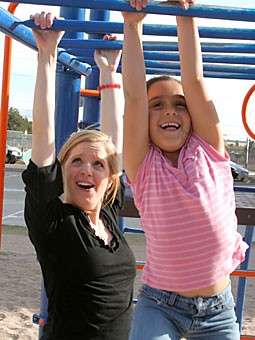As a child, Stacey Webb carried around a baby doll wherever she went because she loved children.
This year, the pre-nursing freshman decided to put that love to good use, joining the ranks of nearly 200 UA students who volunteer with Big Brothers Big Sisters, and she says she couldn’t be happier.
“”It’s such rewarding work,”” she said, looking at her “”little sister,”” 6-year-old Helen Siddon, who was coloring a picture of the number 12 in the library of Roskruge Elementary and Bilingual Magnet Middle School. “”You get back 10 times that what you give.””
In a typical day of volunteering, Stacey walks to Roskruge, 501 E. Sixth St., to meet Helen as she gets out of class.
“”Usually we go out on the playground and Helen will make up imaginary games that we play,”” Webb said,
“”My favorite game is princesses,”” Helen said.
Other times, Webb added, the two will read, draw or work on Helen’s kindergarten homework.
“”The most important thing is just being a positive influence,”” Webb added.
Typically, college students make the best big brothers or big sisters because kids can relate to them because they are younger than adults, said Saundra Sherow, program specialist for Big Brothers Big Sisters.
“”(College students) are people who kids look up to the most,”” she said. “”Their schedules are flexible and often they take the kids on campus, which is really fun for them and gives them a chance to think about the future.””
For Danny Vo, a political science senior, it was the desire to make a difference in someone else’s life that drove him to become a big brother.
“”As a college student, I have the opportunity to be in an environment where I can succeed,”” Vo said. “”A lot of the kids that we deal with aren’t in the same environment and they need someone to look up to, to see that it is possible to go to college and grow and succeed.””
Students can participate in the program as an on-site mentor and meet the children at their schools, or they can be a community-based mentor and take the children around Tucson.
Vo said he watches movies with his little brother, plays tennis and goes to the Farmer’s Market.
While there are many girls who volunteer to be big sisters, Sherow said the program needs more big brothers.
“”We have a waiting list of about 350 kids right now, and over 300 of them are boys who are waiting for a big brother,”” Sherow said.
To volunteer with the program, applicants must undergo a background and fingerprint check before they are interviewed. They answer simple questions about their family history and favorite activities that help create a great match.
As a big brother or sister, volunteers are required to donate two days a month to their little brother or sister in a two-semester commitment, although Sherow said that many contribute more.
“”We’ve had matches that have stuck together for close to seven years,”” she added.
“”Bigs really make a huge impact. They help improve confidence and help to keep their little sisters or brothers off the streets and off drugs.””
Often, she added, big brothers and sisters assume the role of confidants for children who may not have anyone else to talk to.
“”A lot of these kids have never had a friend who would listen to them and care for them, and if they have always encountered rejection like that, having something concrete makes all the difference in the world.””
The program also sponsors monthly events, such as hiking in Sabino Canyon or dance lessons. This month, Big Brothers and Big Sisters will have their largest event of the season, a bowling fundraiser called “”Bowl for Kids’ Sake,”” Sherow said.
“”It costs us close to $1,000 for one match,”” said Stacy Nuttall, events coordinator for Big Brothers Big Sisters. “”This year we are hoping to raise about $215,000 so that we can add an additional 215 matches.””
The event is made possible by dozens of UA organizations, including Blue Chip and the Honors College Student Council, as well as many more fraternities and sororities who donate their time and help, Nuttall said.
“”The UA has a huge impact on our program in so many different ways,”” Sherow added. “”Last semester, we matched 60 UA students as big brothers or sisters, and we would love for more students to get involved.””
Many students shy away from getting involved because it requires an entire year of commitment, Sherow said.
“”When you think about it, two days a month really isn’t that much,”” she said. “”Mostly, you’re just hanging out and having fun.””









